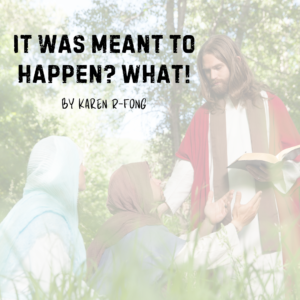
My late husband Mike always had a Plan A and a Plan B. After all we know this adage “Fail to Plan. Plan to Fail.” Perhaps what should be in the back of our minds, or actually the front, is our belief that God has a plan for each of us. I don’t understand how God does it, but hindsight is nonetheless, a beautiful thing to ponder on and to appreciate.
Was my second career in teaching my own doing? I confess not. Looking back, God knew what I needed long before I did: a certificate in teaching, an alumnus to give this novice a chance to teach, enabling me to have part-time income throughout Mike’s illness as well as during Covid days, and crikey! I am still teaching at the same learning centre for the past 15 years (longest job I’ve been at!). Thank you, Lord!
God’s Providence: Trusting in His care
Perhaps I should not be so surprised. The word Providence has popped up many times in conversation. So what is Providence and isn’t it contrary to Free Will?
Simply put, Providence means that God is involved in your life, shaping your path even when you can’t see it.
Robert Frost, in his poem, The Road Not Taken, expresses how frustrating it is when you can’t see where you are going.
Two roads diverged in a yellow wood,
And sorry I could not travel both
And be one traveler, long I stood
And looked down one as far as I could
To where it bent in the undergrowth…
And perhaps as Frost says at the end…
I took the one (road) less travelled by,
And that has made all the difference.
Your decision? Was it really your choice? You exercised your Free Will?
Understanding the balance between Free Will and God’s Providence is a way to help you trust in God while taking responsibility for your actions.
Where does Providence appear in the bible?
Here perhaps is a familiar story: Joseph, the favoured son of Jacob (Israel). Joseph’s life is a powerful example of how God’s providence works through human choices, even bad ones. Joseph’s brothers, driven by jealousy, sold him into slavery, thinking they were getting rid of him for good. But God had a bigger plan.
Through a series of events—false accusations, imprisonment, and unexpected promotions—Joseph became the second most powerful man in Egypt. He saved countless lives during a famine, including his own family.
When Joseph finally revealed his identity to his brothers, he said, “You intended to harm me, but God intended it for good to accomplish what is now being done, the saving of many lives” (Genesis 50:20).
So even when others’ choices hurt us, God can use those situations for His greater purpose. Trust in His providence when life feels unfair.
Here’s another story from the bible. Esther, a woman of great beauty, becomes Queen of Persia. Her Jewish identity is hidden even from the King. When a plot to annihilate the Jews arose, Esther faced a tough choice: risk her life by speaking to the king uninvited or stay silent and let her people perish. Her cousin Mordecai reminded her, “Who knows but that you have come to your royal position for such a time as this?” (Esther 4:14).
Esther’s brave decision to approach the king saved her people, showing how God’s Providence had placed her in the right position at the right time.
Hence like Esther, your choices matter, and God places you where you are for a reason. Even when you’re unsure, God is always working behind the scenes for your good and His glory.
God will make your paths straight
(Proverbs 3:5-6)
Free will and God’s Providence are partners in God’s plan for your life.
So continue to have your Plan A and Plan B. While you have the freedom of choice, take heart that God’s invisible hand and plan is to prosper you (Jeremiah 29:11).
Trust God, make wise choices, and watch His incredible plan unfold in your life!
Shared by Karen R-Fong, a wannabe tai-tai who desires to retire in a library of books and to read with our Lord to her last days.
Article was with the help of Generative AI.
